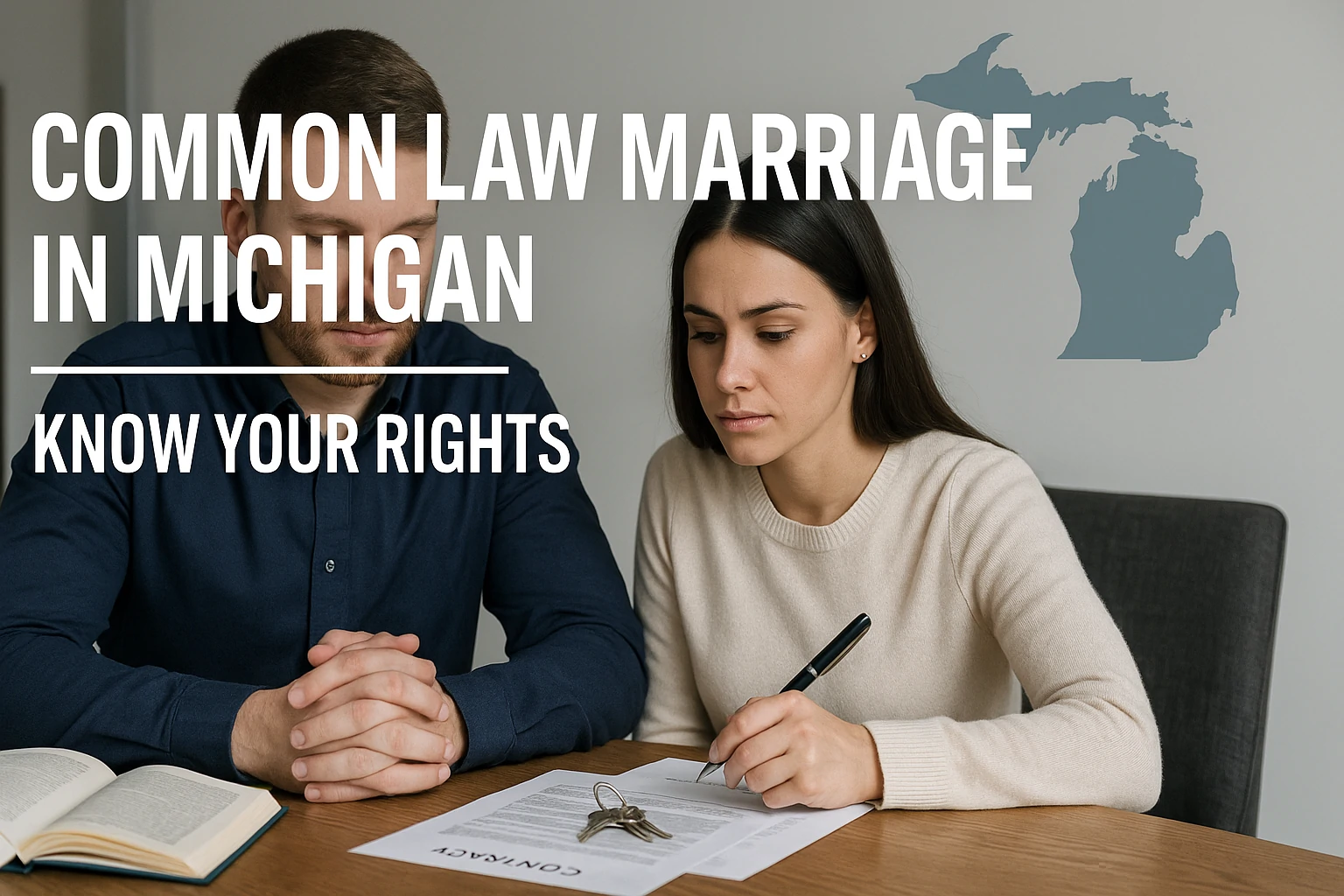Many couples live together and act like they are married. Some think this gives them the same legal rights. In Michigan, this idea often leads to confusion. The law does not support common law marriage. You must understand the rules to avoid legal problems.
Michigan no longer allows new common law marriages. Living together, no matter how long, does not make you a legal spouse. The law does not give you automatic rights in this case. But you still have ways to protect yourself. You must take legal steps to stay safe. This guide shows what the law says, what you can do, and how to secure your future.
If you live with a partner or plan to move in, this article is for you. Learn what counts in Michigan, what does not, and what you need to do now. Clear answers help you plan your life without guessing.
Michigan Does Not Allow New Common Law Marriages
Common law marriage happens without a wedding or license. In some states, couples gain legal rights if they live together and act like a married couple. They may share a home, money, and introduce each other as husband and wife.
These states treat the couple as married after certain conditions are met. The couple may file taxes together or get benefits. They may split property through court if they separate. Some states allow this kind of marriage, but most do not.
Michigan stopped this practice many years ago. You cannot form a common law marriage here anymore. This matters a lot if you want full legal protection.
Michigan’s Law on Common Law Marriage
Michigan banned new common law marriages in 1957. Since that time, the only legal way to marry in the state is through a license and ceremony. If you do not do this, the law will not see you as married.
No matter how long you live together, it does not count. You might share rent, raise kids, and act like a couple, but the state does not recognize the relationship as a marriage. This means you lose many legal rights.
This rule causes problems when couples break up or one partner dies. Without a legal marriage, you may not be able to claim property or benefits. You also may not have a say in health or financial decisions.
Are Any Common Law Marriages Still Valid?
Michigan will recognize a common law marriage from another state. If you lived in a state that allows it and met the rules there, Michigan will honor it. That’s because states must respect each other’s laws.
Not all claims are accepted. You must show proof. That means documents like shared leases, joint bank accounts, or tax returns. You may also need to show that you introduced each other as spouses.
If you moved from another state and think you had a common law marriage, talk to a lawyer. They can check your case and tell you where you stand.
To learn how other states handle this topic, see our guide on Common Law Marriage in Arizona.
Legal Rights of Unmarried Couples in Michigan
If you live with your partner in Michigan without marrying, you do not get legal spousal rights. The law sees you as two separate people. This can affect your home, money, and medical rights.
If your partner owns the house, you may have no claim to it. If your name is not on the deed, you may be forced to leave after a breakup or death. If one of you gets sick, the other may not have any say in care or treatment.
You also miss out on benefits like shared health insurance, survivor benefits, or spousal tax filing. You are not a legal spouse, so many protections are not available to you.
Property Disputes Between Unmarried Partners
Unmarried partners do not receive the same protection as married couples. If the relationship ends, the court does not treat the case like a divorce. Property division follows basic contract and ownership rules.
If one person owns the home or car in their name, that property usually stays with them. The other partner may have no automatic claim. Shared purchases can create disputes if ownership was never put in writing.
Courts may review evidence such as joint accounts, shared payments, or written agreements. Without clear proof, judges often rely on whose name appears on titles or contracts. This can lead to unfair results for someone who contributed money but lacks documentation.
Clear records and written agreements reduce risk. Couples who plan ahead avoid long and costly legal fights later.
Ways to Protect Yourself Without Marriage
You do not need to marry to protect your future. You can still take smart steps. Many couples use legal tools to stay safe and avoid problems. Clear rules help both people know what to expect.
A written agreement is a strong first move. It can explain how you share money, handle property, and divide things if you separate. You can also make a will. This lets your partner inherit your home or assets if something happens to you.
These simple steps give peace of mind. They also prevent legal fights and confusion later.
You should also set up a power of attorney and health care directive. These give your partner the right to make choices if you cannot. These forms are easy to create and can save a lot of stress later.
Understanding Cohabitation Agreements in Michigan
A cohabitation agreement is a contract between two people who live together. It lists who owns what and how bills are split. It also explains what happens if you break up. This keeps things fair and clear.
The agreement must be in writing and signed. It should cover big things like the home, cars, and money. You can also add personal items or pets. You do not need a lawyer, but it is smart to use one.
Courts in Michigan often honor these agreements. They treat them like any other legal contract. This makes them one of the best ways to protect yourself if you do not plan to marry.
Inheritance Rights Without Marriage
If you are not married and your partner dies, you may be left with nothing. You do not get automatic rights. You do not inherit the house, money, or personal items unless your name is on them or you are named in a will.
This shocks many people. They build a life with someone, but the law sees them as strangers. The family of the person who died may get everything, even if they were not close.
To stop this, your partner must name you in their will. They should also update any insurance or retirement accounts. If your name is on the title or account, you will get it. If not, you may lose everything.
Benefits and Insurance Without Legal Marriage
Some places offer “domestic partner” benefits. This is rare and often only in large companies. Most benefits in Michigan require legal marriage. These include Social Security, spousal tax filing, and many health insurance plans.
If your job offers domestic partner benefits, ask what rules apply. You may need to show proof of your relationship. Some plans ask for joint leases or shared bills. Others want a signed form.
You may also be able to add each other to car insurance, bank accounts, or phone plans. Always check what is allowed and what is not. Rules vary by company and policy.
What About Children?
If you have children together, the law treats this differently. Both parents have legal rights and duties. You may still need to go to court to set child support, custody, or visitation. These rules apply even without marriage.
The father may need to sign a form or get a court order to prove paternity. This gives him the right to see the child and make decisions. It also creates a duty to support the child.
Parents should make a plan. They can agree on things like school, health, and where the child lives. If they cannot agree, the court will decide. The child’s best interest is always the top concern.
Conclusion
Michigan does not allow new common law marriages. Living together does not give you the same rights as a legal spouse. Many people still think it does, but this is not true. If you want legal rights, you must take action.
You can protect yourself without marriage. Use contracts, wills, and other legal tools. They are simple, smart, and help avoid future problems. Do not wait for trouble. Plan ahead.
Always check with a family lawyer in Michigan. Each case is different, and the law changes over time. Protecting your home, money, and health choices is important. A few steps now can save a lot later.




